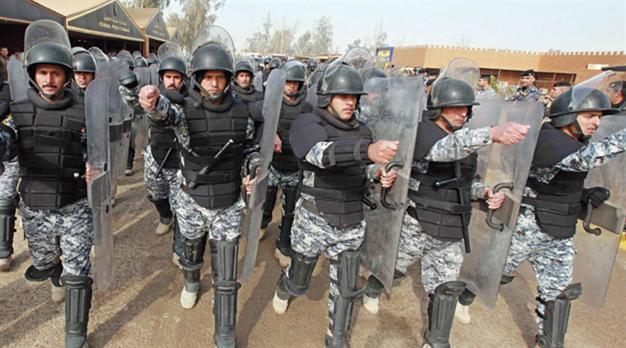US ‘wasted’ millions Iraqi police
BAGHDAD - The Associated Press

Iraqi riot police march at a graduation ceremony in Baghdad. A report by the US Special Inspector General for Iraq Reconstruction finds that the American Embassy in Baghdad never got a written commitment from Iraq to participate in the training sessions. AP photo
U.S. auditors have concluded that more than $200 million was wasted on a program to train Iraqi police that Baghdad says is neither needed nor wanted.The Police Development Program, which was drawn up to be the single largest State Department program in the world, was envisioned as a five-year, multibillion-dollar push to train security forces after the U.S. military left last December. But Iraqi political leaders, anxious to keep their distance from the Americans, were unenthusiastic.
A report by the Special Inspector General for Iraq Reconstruction, found that the U.S. Embassy in Baghdad never got a written commitment from Iraq to participate. Now, facing what the report called Baghdad’s “disinterest” in the project, the embassy is gutting what was supposed to be the centerpiece of ongoing U.S. training efforts in Iraq. Auditors noted that it “has clearly been difficult” for American diplomats to secure a solid commitment from Iraq’s government to participate in the training program. Still, the report concluded, “The decision to embark on a major program absent Iraqi buy-in has been costly” and resulted in “a de facto waste.”
Auditors said the U.S. has spent about $8 billion to train and equip Iraqi police since the 2003 U.S.-led invasion. At that time, there were about 58,000 police in Iraq. The report said that number had grown to 412,000 by 2010. Other estimates put the size of Iraq’s federal, local and border police force at 650,000.
The training was led by the American military until last October; just six weeks before U.S. troops left Iraq for good. The embassy took over the program, but with what yesterday’s report described as “mixed results.”
Iraq’s self-rule northern Kurdish region has embraced the program and, as a result, half of the remaining 36 U.S. advisers assigned to police training will be based in the Kurdish capital of Arbil, 350 kilometers north of Baghdad.
In a July 26 letter responding to a draft of the report, acting Assistant Secretary of State Carol Z. Perez said the embassy will need an unspecified amount of additional funding this year to continue training Iraqi police into 2013. She disputed the finding that the funds have been wasted, noting Iraqis will continue to use the Baghdad Police College Annex for training. Moreover, Perez said, the embassy has been assured by Principal Deputy Interior Minister Adnan al-Asadi that Iraq is committed to a streamlined version of the training program. U.S. diplomats will continue working with top security officials, she said, “to ensure that our police assistance efforts meet mutual goals and objectives and to sustain senior-level Iraqi commitment to the program.” The auditors, however, said those assurances fall far short of a written commitment, and quoted al-Asadi as telling U.S. inspectors that the police training program is “useless.”
The findings call into question funding needs at the largest U.S. embassy in the world, as the Barack Obama administration prepares its new spending plan for the 2013 fiscal year that begins Oct 1. While auditors said it’s unknown how much the embassy in Baghdad is requesting, additional money for the police program “may not be needed.”
















